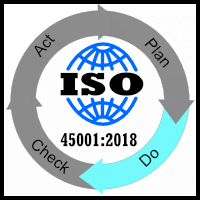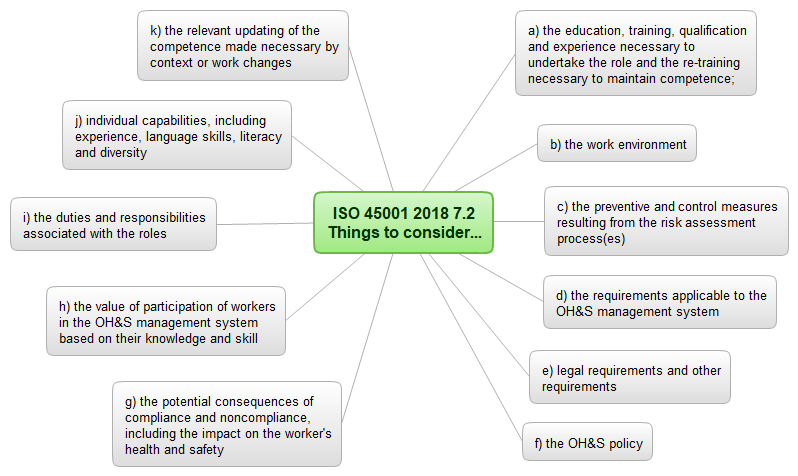|
|
ISO 45001-2018 7.2 CompetenceSend comments on this topic |
FREE QHSE Software Click <HERE> to Learn More |
||
QHSE Support >(Site Map) Health & Safety Guidance > ISO 45001:2018 Clauses > ISO 45001:2018 clause 7 >
ISO 45001:2018 Clause 7.2 Competence
|
PLAN |
DO |
CHECK |
ACT |
Clause 7.2 Breakdown
7.2 Competence
The organization shall:
a. determine the necessary competence of workers that affects or can affect its OH&S performance;
b. ensure that workers are competent (including the ability to identify hazards) on the basis of appropriate education, training or experience;
c. where applicable, take actions to acquire and maintain the necessary competence, and evaluate the effectiveness of the actions taken;
d. retain appropriate documented information as evidence of competence.
Organizations shall determine the competence requirements for workers that affect or could affect the OH&S performance. This also includes:
•contractors,
•sub-contractors,
•agency staff,
•lease workers,
•freelances,
•at-will, and
•zero-hours employees, etc.
Basically, any workers who carry out activities under the control of the organization. Organizations will also need to verify the competence of these externally supplied human resources, including maintaining evidence of continuing competence as documented information, Clause 7.5.
Larger organizations are likely to have a competency management system that will allow competency to be managed and maintained by the contractor. The organization, having internal systems and audit arrangements in place to verify workers continuing suitability.
Organizations are likely to develop competency matrices linked to an employee's job description. Some organizations may have generic job descriptions, allowing more specific competency requirements to be controlled under separate organizational processes and procedures. However, competency requirements are managed, they will need to be documented in such a manner as to be easily retrievable for audit purposes.
It should be remembered that workers in the same role may well have vastly differing career paths, including:
•past experience,
•skill levels,
•training,
•qualifications, and
•education.
This means that competency cannot be guaranteed by grade or post alone and must be established and documented for each employee. The training itself is not sufficient to demonstrate competence, which must be demonstrable through exams, tests, monitoring, etc. Auditors will look for substantiating evidence to determine that competency requirements exist and have been met.
As a minimum, most organizations shall require competent staff to undertake duties mandated in country-specific health and safety legislation. This would typically include, and to name a few, activities like:
•First Aiders,
•Fire Wardens,
•Health and Safety Representative.
Fortunately, because of the large numbers of organizations requiring competent staff for these roles, many training suppliers are set up to meet these needs.
When determining the competence of workers roles, the standard recommends the following area are taken into account.
Useful integrated management system cross references
ISO 9001
ISO 14001
•ISO 14001-2015 7.2 Competence
Help file v2.276.407 : QHSE Support - Website On Safe Lines
onsafelines.com QHSE Software 2025 : Webmaster: Brian G. Welch MSc(QHSE), NVQ4(OH&S), CMIOSH




